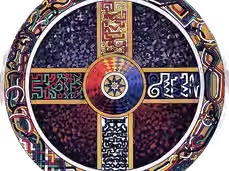Justice in the Eyes of Compassion: Seeing the Other Without Possession
- Feb 19, 2022
- 3 min read
Updated: Dec 27, 2025

There is a little story Metropolitan Anthony tells of a young women put into prison during the Russian Revolution. It explores the issue of justice in how we see others. We usually see justice in terms of attribution or retribution, of allotting a person's due, but here justice goes deeper and further to recognising the right of another to be irreducibly different from ourselves, accepting the fact that the other has no reason to be a replica of myself. That they are called to be in the likeness of God, not to be the likeness of me.
We are all called to have such compassionate regard for one another. To acknowledge another person's right to be themselves, not to resemble me, is the fundamental act of justice which alone makes it possible for us to discern their creation in the divine image. Thomas Merton, the well-known writer and Cistercian monk, once summed this up: “The beginning of love is the will to let those we love be perfectly themselves, the resolution not to twist them to fit our own image. If in loving them we do not love what they are, but only their potential likeness to ourselves, then we do not love them: we only love the reflection of ourselves we find in them.”

The story has long meant a great deal to my heart, so I share it here:
'During the Russian Revolution, a young woman was put into prison. Days of solitary confinement, nights of interrogation, followed. During one of those nights she felt that her strength was failing her, her fortitude and her readiness to stand the test were weakening, and of a sudden she felt hatred and anger welling up in her heart. She wanted to look up at her interrogator, challenge him with all the violence she could muster to break the spell of these endless, hopeless nights of torture, even if she should die for it. She looked up indeed, but she said nothing, because, on the other side of the table, she saw a man as completely exhausted as she was, ashen, worn out, with the same expression of despair and distress on his face, and suddenly she realised that they were not, properly speaking, enemies. Yes, they were sitting in two opposite sides of the table, they were in an irreconcilable tension and opposition, and yet they were both captives of the same historical tragedy, caught up in the same whirlwind of history that had thrown one in one direction and the other in another; neither was free, both were victims. And at the moment she realised, because she saw in the other man a victim like herself, that he also was a human being, not simply a function. He was not her enemy, he was a fellow human being, caught up together with her, inseparable from her, in the tragedy. She smiled at the man. That was the act of recognition which is ultimate justice.'
Perhaps this story means so much to me because my heart so aspires to it, although I more often than not fail. And have failed recently in a difficult and painful situation of conflict with someone where I have felt misunderstood and wronged, wanting to fight my corner and declare the injustice done to me, giving in destructively to the welling anger.
What makes the difference? I think it is being able to see clearly - 'naked seeing' as the Buddhists say, or seeing with 'naked awareness.' Jesus of Nazareth so often tells us to open our eyes, how we are blind and do not see. And his path to this seeing is two fold - through healing of that which impairs or obscures our vision, which may be rooted in our emotional wounding, and through letting go of our egocentricity to see through the eyes of God - the eyes of unconditional loving compassion - recognising our communion with the other, being created in the same divine image, rather than our difference.
Part of this seeing is also recognising we are all capable of all acts in our shared humanity. Do I think that I am any different? I know that I am not. And, part of this knowing is to recognise our Shadow. The ancient Roman poet Terence once said: 'I am human and, therefore, I consider nothing that is human alien to me.'
The Buddhist teacher Thich Nhat Hanh echoes this in his poem ‘Please Call Me By My True Names’ :
‘I am the 12 year old girl
refugee on a small boat,
who throws herself into the ocean
after being raped by the sea pirate.
And I am the pirate,
my heart not yet capable
of seeing and loving.
Please call me by my true names,
so I can wake up,
and so the door of my heart
can be left open,
the door of compassion.’








































